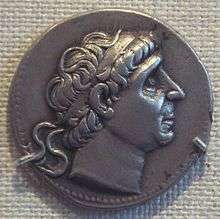Antiochus II Theos
Antiochus II Theos (Greek: Ἀντίοχος Β΄ ὁ Θεός; 286 – July 246 BC) was a Greek king of the Hellenistic Seleucid Empire who reigned from 261 to 246 BC.[2] He succeeded his father Antiochus I Soter in the winter of 262–61 BC. He was the younger son of Antiochus I and princess Stratonice, the daughter of Demetrius Poliorcetes.[3]
| Antiochus II Theos | |
|---|---|
 Coin of Antiochus II. | |
| Basileus of the Seleucid Empire | |
| Reign | 2 June 261 – July 246 BC |
| Predecessor | Antiochus I Soter |
| Successor | Seleucus II Callinicus |
| Born | 286 BC Syria |
| Died | early July 246 BC (aged 39–40) Asia Minor |
| Spouse | Laodice I Berenice |
| Issue | with Laodice: Seleucus II Callinicus Antiochus Hierax Apama Stratonice of Cappadocia Laodice with Berenice: Antiochus |
| Dynasty | Seleucid dynasty |
| Father | Antiochus I Soter |
| Mother | Stratonice of Syria |
| Religion | Greek polytheism |
Reign
He inherited a state of war with Ptolemaic Egypt, the "Second Syrian War", which was fought along the coasts of Asia Minor, and the constant intrigues of petty despots and restless city-states in Asia Minor. Antiochus also made some attempt to get a footing in Thrace.[4] During the war he was given the title Theos (Greek: Θεός, "God"), being such to the Milesians in slaying the tyrant Timarchus.[5]
During the time Antiochus was occupied with the war against Egypt, Andragoras, his satrap in Parthia, proclaimed independence. According to Justin's epitome of Pompeius Trogus, in Bactria, his satrap Diodotus also revolted in 255 BC, and founded the Greco-Bactrian Kingdom, which would further expand in India in 180 BC to form the Indo-Greek Kingdom (180–1 BC).
In 253 BC, in the aftermath of the Second Syrian War, Antiochus II made peace with the pharaoh Ptolemy II Philadelphus. He divorced Laodice and married Ptolemy II's daughter Berenice, with the understanding that any children born from their union would inherit the Seleucid throne.[6] Although no longer queen, Laodice was still a very powerful and political influential figure. Antiochus gave Laodice various land grants throughout Anatolia which are known through inscriptions;[7] she owned a large estate in the Hellespont,[8] other properties near Cyzicus,[9] Ilion and in Caria.[8] In a royal record at Sardis mentions her land titles were to be kept as royal land in disposal in grants or sales.[10]
During her stay in Ephesus, Laodice continued numerous intrigues to become queen again. By 246 BC Antiochus had left Berenice and their infant son Antiochus, in Antioch to live again with Laodice I in Asia Minor.[3] Laodice took the occasion to poison Antiochus while her partisans at Antioch murdered Berenice and their infant son. Antiochus was buried in the Belevi Mausoleum.[11]
Laodice I then proclaimed Seleucus II as King. With his cousin-wife Laodice I, Antiochus had two sons: Seleucus II Callinicus, Antiochus Hierax and three daughters: Apama, Stratonice of Cappadocia and Laodice.[12]
Relations with India
An uncertain Antiochus is mentioned[13] in the Edicts of Ashoka, as one of the recipients of the Indian Emperor Ashoka's Buddhist proselytism:
- "And even this conquest [preaching Buddhism] has been won by the Beloved of the Gods here and in all the borderlands, as far as six hundred yojanas (5,400-9,600 km) away, where Antiochus, king of the Yavanas [Greeks] rules, and beyond this Antiochus four kings named Ptolemy, Antigonos, Magas and Alexander rule."[14]
Ashoka also claims that he encouraged the development of herbal medicine, for men and animals, in the territories of the Hellenistic kings:
- "Everywhere within Beloved-of-the-Gods, King Piyadasi's [Ashoka's] domain, and among the people beyond the borders, the Cholas, the Pandyas, the Satiyaputras, the Keralaputras, as far as Tamraparni and where the Greek king Antiochus rules, and among the kings who are neighbours of Antiochus, everywhere has Beloved-of-the-Gods, King Piyadasi, made provision for two types of medical treatment: medical treatment for humans and medical treatment for animals. Wherever medical herbs suitable for humans or animals are not available, I have had them imported and grown. Wherever medical roots or fruits are not available I have had them imported and grown. Along roads I have had wells dug and trees planted for the benefit of humans and animals."[15]
Alternatively, the Greek king mentioned in the Edict of Ashoka could also be Antiochus's father, Antiochus I Soter, who arguably had more proximity with the East.[13]
Notes
- Inscriptions of Asoka. New Edition by E. Hultzsch (in Sanskrit). 1925. p. 3.
- "Antiochus II Theos". Livius.
- Chisholm, Hugh, ed. (1911). . Encyclopædia Britannica. 24 (11th ed.). Cambridge University Press. p. 604.
- Dr. Jordan Iliev. "The Campaign of Antiochus II Theos in Thrace" - History Studies. International Journal of History, 2013, 5/1, pp. 211-222. Archived March 7, 2014, at the Wayback Machine
- Appianus, Syriaca, 65.
- Bromiley, International Standard Bible Encyclopedia: A-D p.144
- Billows, Kings and colonists: aspects of Macedonian imperialism p.126
- Grainger, A Seleukid prosopography and gazetteer p.47
- Laodice I article at Livius.org
- Billows, Kings and colonists: aspects of Macedonian imperialism p.p.114-5
- The Mausoleum of Antiochus II Theos
- Biographical information on Antiochus II Theos
- Jarl Charpentier, "Antiochus, King of the Yavanas" Bulletin of the School of Oriental Studies, University of London 6.2 (1931: 303-321) argues that the Antiochus mentioned was unlikely to be Antiochus II, during whose time relations with India were broken by the Parthian intrusion and the independence of Diodotus in Bactria, and suggests instead the half-Iranian Antiochus I, with stronger connections in the East.
- Translation of Jarl Charpentier 1931:303-321.
- Edicts of Ashoka, 2nd Rock Edict.
External links
| Wikimedia Commons has media related to Antiochus II. |
Antiochus II Theos Born: 286 BC Died: 246 BC | ||
| Preceded by Antiochus I Soter |
Seleucid King 261–246 BC |
Succeeded by Seleucus II Callinicus |
